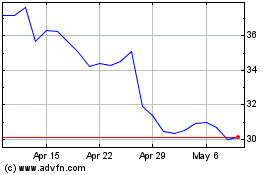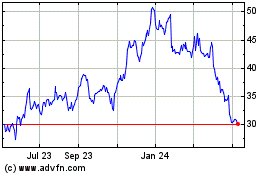By Ted Greenwald
Intel Corp. agreed to buy Israeli car-camera pioneer Mobileye NV
for $15.3 billion, one of the chip maker's biggest acquisitions
ever and the latest bet on Silicon Valley's vision of cars as
turbocharged computers on wheels.
The deal, which amounts to a 34% premium over Mobileye's closing
share price Friday, would give Intel ownership of a widely used
technology in the rapidly emerging business of computer-assisted
driving. It also would give Intel a long list of customer
relationships Mobileye has with auto makers, including General
Motors Co., Volkswagen AG and Honda Motor Co.
Intel is joining a race to create autonomous vehicles that has
accelerated recently as unconventional auto companies have jumped
in, sparking bidding wars for companies that specialize in
self-driving gear or software. Besides Intel, Tesla Inc., Alphabet
Inc.'s Google and Uber Technologies Inc. also have made big bets on
car technology. Their entry has created a complex web of
relationships between Silicon Valley, Detroit and other automotive
hubs that has shifted the center of gravity in the global car
business.
The deal for Mobileye is the second largest in Intel's 48-year
history, after its $16.7 billion acquisition of Altera Corp. in
2015, and its size signals Intel's strong desire to stake out a
significant position in the market after the chip maker largely
missed out on the smartphone boom.
Intel, which faces a raft of challenges in its core business of
powering the personal-computer industry, estimates the market for
autonomous-driving systems, services and data will reach $70
billion by 2030. That includes navigation, in-car communications
and advertising -- and keeping a car's perception and
decision-making capabilities finely tuned to avoid mishaps as road
conditions change.
"You can think of the car as a server on wheels," Intel Chief
Executive Brian Krzanich said in an interview. "The average
autonomous car will throw out four terabytes of data a day, so this
is one of the most important markets and one of the fastest-growing
markets."
The industry will include not only cars but autonomous
algorithms, digital maps and a variety of sensors -- all new
markets to Intel, Mr. Krzanich said. "And they require all the
assets Intel has," he said.
Mobileye's technology helps a car see and understand the space
around it, providing functions such as automatically keeping a car
in its lane. It includes 36-degree vision and mapping, and
integrates various sensor elements such as cameras, radar, sonar
and the laser-sensing technology known as LiDAR. The company's
chips are already installed in more than 300 car models, Mobileye
says on its website.
The considerable premium Intel is willing to pay for Mobileye
reflects the enormous value tech companies see in the automation of
cars and trucks, said Mike Ramsay, research director at Gartner
Inc. It would have been inconceivable a few years ago -- it is more
than double what the private-equity firm Cerberus Capital
Management LLC paid for Chrysler LLC in 2007.
Mobileye shares jumped 28% Monday, closing at $60.62. Intel fell
2.1% to $35.16.
The deal for Mobileye is the latest move by big tech companies
into the automotive sector. Qualcomm Inc., a fierce rival to Intel
in communications chips, agreed in October to acquire NXP
Semiconductors NV, whose chips handle low-level automotive
functions such as braking and fuel injection, for $39 billion. Last
week, Samsung Electronics Co. completed its $8 billion deal to buy
Harman International Industries Inc.
While semiautonomous features in cars have become commonplace,
efforts by companies such as Google and Tesla to make cars more
fully autonomous are part of a new frontier that has stirred both
excitement and controversy. Tesla had used Mobileye's technology
for semi-autonomous driving programs until recently, and the two
companies had a public spat about how the features should be
deployed after a fatal Tesla crash in May.
Still, car makers expect to have fully self-driving cars on the
road early in the next few years, with first deployments likely to
be in ride-sharing programs or on lower-speed roads, such as gated
communities. GM last year spent $1 billion to acquire Cruise
Automation to expedite the auto maker's self-driving program. Uber
bought self-driving truck maker Otto for $680 million in
August.
Intel's acquisition of Jerusalem-based Mobileye dwarfs such
deals. The two companies already have ties, working with BMW AG to
road-test about 40 self-driving cars in the U.S. by the end of the
year.
Executives at Mobileye and Intel say they envision Mobileye
technology helping vehicles see and respond to conditions on the
road. Intel processors in remote data centers, connected by
high-speed wireless technology also developed by Intel, would help
interpret objects in a car's field of vision and avoid mishaps.
The deal with Mobileye "merges the intelligent eyes of the
autonomous car with the intelligent brain that actually drives the
car," Mr. Krzanich said in a note to employees. "The saying 'what's
under the hood' will increasingly refer to computing, not
horsepower."
Mr. Krzanich said the acquisition would immediately add to
Intel's adjusted earnings. Mobileye reported net income last year
of $108.4 million on sales of $358.2 million.
Intel has struggled lately with the persistent decline of PC
sales -- its core business for decades -- which show little sign of
reversing. To drive growth, the company is focusing on artificial
intelligence, an area where large cloud-computing companies such as
Amazon.com Inc., Google and Facebook Inc. have been expanding their
data centers and purchasing new kinds of chips.
Self-driving cars are among the more promising applications of
AI, and Intel has pushed aggressively to acquire companies in the
field. Last year, it bought Nervana, a company developing chips
that aim to process some types of calculations used in AI at higher
speed.
--Auston Hufford and Chester Dawson contributed to this
article.
Write to Ted Greenwald at Ted.Greenwald@wsj.com
(END) Dow Jones Newswires
March 14, 2017 02:47 ET (06:47 GMT)
Copyright (c) 2017 Dow Jones & Company, Inc.
Intel (NASDAQ:INTC)
Historical Stock Chart
From Mar 2024 to Apr 2024

Intel (NASDAQ:INTC)
Historical Stock Chart
From Apr 2023 to Apr 2024
